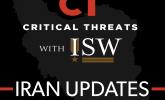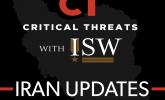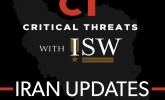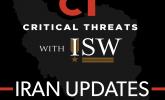April 7, 2023 - ISW Press Iraq and Syria. The Iraqi Kurdish Peshmerga and Iraqi Security Forces (ISF) will likely remain unable to address coordination issues on the line of control between Iraqi Kurdistan and federal Iraq, likely enabling ISIS to continue its low-grade insurgency in Iraq’s disputed internal boundaries (DIB). ISIS uses the unsecured areas between Iraqi Kurdistan and federal Iraq to enable attacks against urban areas, such as Kirkuk city, and to resupply its attack cells across eastern Iraq. The coordination issues between the ISF and Kurdish Peshmerga will likely continue indefinitely without a political solution to the DIB issue, as stipulated under the 2005 Iraqi constitution.
Burkina Faso. The Burkinabe junta has significantly increased drone strikes targeting al Qaeda and Islamic State–affiliated militants since late March 2023 to compensate for manpower capacity limitations and boost its popular support. The drone strikes may temporarily degrade the insurgents’ support zones and their ability to organize large-scale attacks on Burkinabe forces. However, both groups will likely adapt to continue attacks, and the junta’s use of drone strikes will not address the inherent manpower shortage that constrains Burkina Faso’s counterinsurgency operations.
Mali. Al Qaeda–linked militants have continued attacking Malian security forces in the region surrounding Mali’s capital since it launched an offensive in the area in January 2023. The campaign demonstrates the militants’ ability to sustain attacks in southern Mali and increases the likelihood that they have established support zones near the Malian capital. The group likely seeks to primarily discredit and undermine the junta’s legitimacy with this campaign and will likely focus on military targets over civilian targets to achieve this goal.
Afghanistan. The Taliban have conducted more raids targeting Islamic State Khorasan Province (ISKP) in Mazar-e Sharif, northern Afghanistan’s largest city, over the past three weeks than in the rest of 2023 combined. ISKP is expanding to areas in northern Afghanistan where CTP has not previously observed ISKP activity. The Taliban supreme leader is planning to purge suspected ISKP sympathizers in the Taliban’s ranks, which may reduce ISKP’s ability to attack high-value Taliban targets. This purge risks further marginalizing non-Pashtun Taliban leaders and increasing support for anti-Taliban groups, including ISKP.











